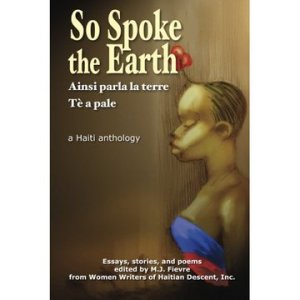My grandmother taught me Kreyòl. You must know where you come from, so you understand where you’re going, she said. Kreyòl: an open door to the culture of my ancestors.
Once a year, my grandmother arrived to the US with two overweight suitcases stuffed with presents; the packages were first enfolded in newspaper, then in colorful Christmas or birthday gift wraps, our names written on a piece of masking tape. Fresh kasav and Haitian peanut butter for my father, sweet Haitian honey and chanm chanm for me, lwil maskriti for my mother—the list goes on. Grandma sat on the bed, my mother and my aunt [name] at her side, all three gossiping in Kreyòl, laughing and exchanging jokes as Grandma went through the contents of the massive suitcases. I sat at her feet with the other children, looking up expectantly as each package emerged, knowing that somewhere in one of these bags was a gift with my name on it—a token from Haiti chosen especially for me and delivered in Kreyòl, “Sa a se pou ou.”
My grandmother lived in Port au Prince, on Rue Monseigneur Guilloux, a maze of streets and people and color and music. Her pink house was located on a steep hill and even steeper stairs ascended to the porch. When I visited in the summer, my little knees hit my stomach as I rushed through the living room with its ornate carved wooden furniture, past the bedrooms where a few of my uncles and cousins still lived, past the bathroom and out the back door into the lakou, where my grandmother sat under the almond trees. My heart burst with happiness as delight spread on her face. A surprised “oh oh!” escaped her lips, followed by the exclamation that I was becoming such a young lady, a demwazèl. I fell into her arms, into her kisses, her Kreyòl, her smell.
As the adults caught up with one another in the backyard, I listened quietly, nursing a cola champagne. I puzzled over the adult conversations, their enthusiastic Kreyòl revealing the strong culture and history of our people; I remembered the colloquialisms and the names of estranged family members. As the excitement of the day caught up to me, I rested my head against my grandmother’s knee, trying not to drift off, not wanting to leave that little circle of family and togetherness, the Kreyòl washing over me.
Grandma was the matriarch; she was my Haiti, my home. As her earthy Kreyòl enfolded me, I understood how being Haitian permeates every part of my life. My culture and my language make me stronger; they give me something to lean on.
I would take this knowledge back with me to Long Island.
At family gatherings in the U.S., the adults always put on a Coupe Cloue album to bring the party to a feisty end. As the singer Gesner Henri peppered his songs with anecdotes, I would join in the laughter of the older folks. While many of the kids in the family—the first and second-generation American-born children, with one foot in and one foot out of the culture—tried to puzzle out what was so funny about what Gesner’s words, I understood Kreyòl, thanks to my grandmother. Several years later, in Central Africa, I heard Coupe Cloue playing on a street radio. Although the singer’s familiar voice was unmistakable, I stopped a pedestrian, just to make sure, and the man reassured me. “Oh yes,” he said, “the Gabonese love Coupe Cloue. We love to listen to his stories. And Haitian music is amazing.” Imagine my pride!
My grandmother later moved to a house in Avenue Poupelard, on a block that bustled with movement. Sitting on the porch, I people-watched, listening to the Kreyòl sounds of the neighborhood school children at recess. It’s on that porch that I told Grandma about my own school in Long Island.
“The children make fun of me, Grandma. My gums are brown and not pink like everyone else.” I was in tears. “They make me feel like I’m not quite human.”
I had been made fun of because of my skin tone, but this somehow seemed worse. It made me feel like an alien.
“Did you know,” Grandma said, “that in Haiti, they have a special name for the type of gums that you have? In Kreyòl, they call them bèl dan.”
I smiled when she said this. Bèl dan literally meant beautiful teeth.
Later in her life, my grandmother lay in a bed in the front room of the house, unable to speak. When I visited her for the first time after the stroke, I witnessed the riot of emotions chasing one another across her face. First confusion, then surprise, and ultimately sadness. She began to cry, mouthing my name, the Kreyòl sounds lost somewhere deep in her throat.. I showered her with hugs and kisses, speaking gently in the language she’d taught me to love.
When we buried her in Bombardopolis, the crowds filled the little village, Kreyòl floating in the warm and hibiscus-perfumed air. A young lady stopped me at the cemetery. “Look at your bèl dan, ” she said.
Only then did I smile.
I crouched down to touch the red earth of my grandmother’s home town. This is the country of my ancestors, I thought. The country of my parent’s birth.
United States, June 13, 2011
* * *
Juderns Exceus grew up traveling all over the world, and making annual trips to Haiti until she was well into her 20’s. She graduated from Wellesley College with a B.A. in French and International Relations. She also earned her J.D. from Howard University. She currently travels between New York and South Florida and maintains several blogs.





Leave a Comment